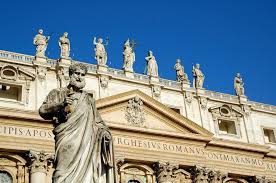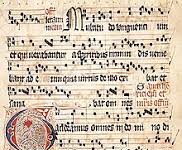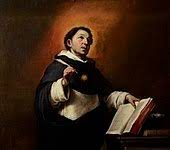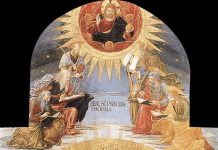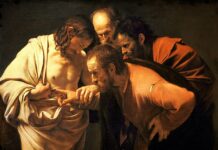Thomas Erastus (1524 – 1583) was a Swiss physician and theologian who adopted the newfangled heretical doctrines of Ulrich Zwingli, a sort of extreme Calvinist, who rejected most of the sacraments, and believed the ‘Lord’s Supper’ was a but a symbol. However, his name has gone down in history as ‘Erastianism’, for his apparent doctrine that the Church should be subservient to the State, with civil authority commandeering and trumping the ecclesiastical. There are other versions and names for this erroneous doctrine with different flavour and emphases – Febronianism, Gallicanism, Caesaropapism – but they all have in common that the secular authority can tell the bishops, and along with them, the priests and laity, what they may or may not do, not just in the secular domain, but the ecclesial and even liturgical.
The headlines for many dioceses have it: ‘The Church will re-open when the secular authority decrees that it is safe to do so’. More than that, the church’s liturgical practices are also governed by civil decree: After a three-month closure of all of our churches, shuttered and locked (while many stores were not), they are only now opening, slowly, but with differing protocols to keep people ‘safe’, again, under the advice – one would use a stronger word – from secular authorities: In many, if not most, dioceses, it is now requisite to wear a mask, to receive Holy Communion on the hand – in one place I read of, there is to be Plexiglas wall, with an opening into which one puts one’s hand to receive from the minister, like receiving a ticket for a film – never to sing, no choirs, no hymnals or missalettes, no holy water, no touching anyone or anything, six feet spacing.
To say the least, Liturgy – the perennial and traditional Holy Sacrifice of the Mass – will not quite be the same.
We should be clear where all this is coming from: Not so much from the governing authorities themselves, but from the ‘experts’ they have hired, or been forced to hire, to give them advice, which they pass along to our own pastors, who acquiesce, most without the least hint of questioning, resistance or demurring – in fact, dioceses have often gone beyond what was eventually decreed. There have been exceptions, with bishops in Minnesota of all places defying their own governor’s extreme lockdown. An spark of the parrhesia of the Apostles, which one hopes soon fans into a flame.
These experts are usually epidemiologists, specialists who track the spread of diseases within a population, using mathematical modeling – think climate change – to predict what a given illness (virus, bacteria, or other vector) will do. They are often wrong, and their predictions of the magnitude of this current Covidian crisis have been off by several orders of magnitude. In other words, there is some risk, especially for the elderly and those with severe respiratory conditions, but for the vast majority of people, it seems to be minimal.
We might debate the level of risk all day long, but what of it? Did the early Christians wait for the green light from Nero to start celebrating Mass? And, when they did so, attendance was a decidedly risky endeavour, punishable by a horrific death, right up to the time of Constantine, and beyond. Under the reign of Elizabeth I, ‘Good Queen Bess’, celebrating or attending Mass, or even hiding priests, was a capital offense. And we haven’t even started with the Communists, continuing into our own day.
Yes, this is a bit different, with the evil of a virus and not the evil of persecuting tyrants, but there are similarities that must be pondered, namely, what sort of ‘risk’ is requisite to shut down the sacramental economy, and, not only that, but ever-after, to alter the way Liturgy is celebrated, to say nothing of the broader society, all in the name of an rather extreme notion of ‘safety’, which is impossible in this world. Are we not always on the brink of death and eternity, a few missed heartbeats or breaths away, and what really is life without some element of risk?
There have been times in the past when churches were decreed closed due to pestilence and other dangers, but, it should be the Church which decides this, along all other Church matters, and not the state. Not only that, but following a point made in a recent post, the faithful should see that it is the Church – that is, their own bishop – deciding, and not the government, nor even the bishop being coerced by the state. That way, we as a laity at least we know whom we are being asked to obey (and more on that soon).
We are in perilous times, and the slide towards Erastianism and a secular Church – the phrase is deliberately oxymoronic – is a subtle and insidious one, the perennial temptation of the lure of the world, which must be resisted by might and main, for the freedom to worship God, to receive the sacraments, to live a liturgical life, so that we might resist the world, the flesh and the devil.
Render to Caesar what is Caesar’s, and to God, what is God’s.
This may not be the path to safety and comfort, but it is certainly the path to heaven.

